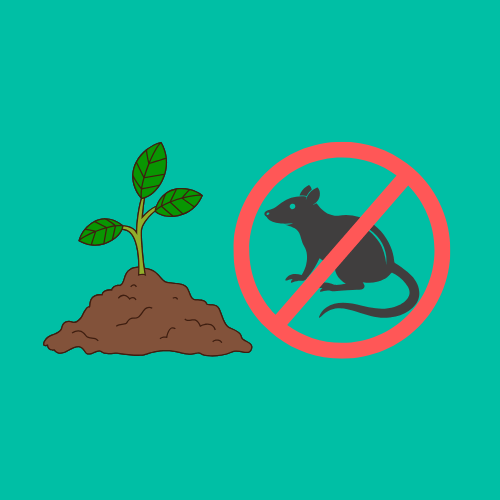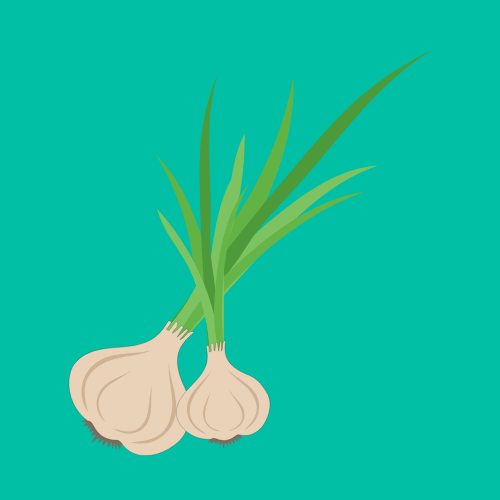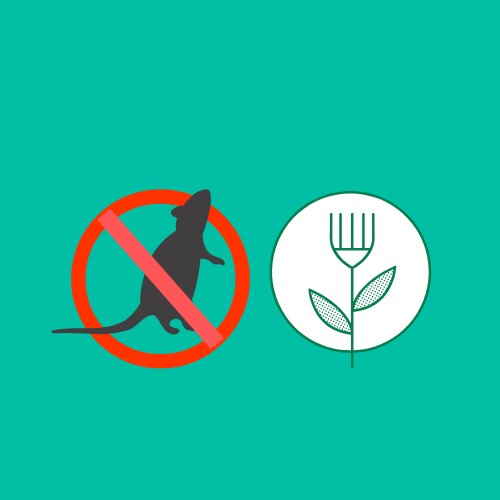Outdoor Plants That Keep Rodents Away [Deter Rodents]

Rodents might be small, but they can wreak havoc in your garden and around your home. If you’re looking for a natural way to deter these pesky critters, outdoor plants can be your best ally.
Some plants emit scents that rodents find repellent, while others create physical barriers that keep them at bay.
Here’s a guide to the most effective outdoor plants that deter mice and rats, along with tips on how to use them for maximum effectiveness.
Get our Gardening Buddy and find veggies that fit your conditions best.
You Can Grow It!
Peppermint
Peppermint is one of the most effective natural repellents for rodents. Its strong, minty aroma is pleasant to humans but overpowering for pests like mice and rats.
How to Use Peppermint to Repel Rodents
- Plant peppermint near entry points, such as doors, windows, and garage openings.
- Place it in garden beds around vegetable patches to protect your crops.
- Crush a few leaves and spread them near rodent-prone areas for added effectiveness.
Bonus: Peppermint is also great for deterring ants, spiders, and other pests!

Lavender
Lavender’s calming scent may help humans relax, but it sends rodents running the other way. The plant’s strong fragrance masks the smell of food, making your garden less attractive to critters.
Best Practices for Using Lavender to keep rodents away
- Plant it along garden borders and near outdoor seating areas.
- Use dried lavender sachets in sheds or outdoor storage spaces to keep pests away.
- Harvest lavender to use inside your home for additional pest control.

Marigolds
Marigolds are not just vibrant and cheerful—they’re also a natural deterrent for rodents and other pests. Their strong scent is unappealing to many critters, making them a great addition to your garden.
How to Plant Marigolds for Pest Control
- Surround your vegetable garden with marigolds to protect your crops.
- Place them in pots near doorways and patios.
- Combine them with other pest-repelling plants like mint or lavender for a layered defense.

Garlic
Rodents can’t stand the sharp, pungent aroma of garlic. This versatile plant is easy to grow and doubles as a flavorful addition to your kitchen.
Ways to Use Garlic in the Garden
- Plant garlic cloves around the perimeter of your garden to create a natural barrier.
- Crush a few cloves and spread them near burrows or hiding spots.
- Use garlic spray (made from crushed garlic and water) on plants to enhance its repelling effects.

Rosemary
Rosemary is a hardy herb that rodents dislike. Its woody stems and fragrant leaves make it an excellent choice for deterring mice and rats.
How to Grow Rosemary for Rodent Control
- Plant rosemary in containers near your outdoor dining areas or entrances.
- Use it as a decorative hedge around garden beds.
- Incorporate fresh or dried rosemary into your compost pile to deter scavenging rodents.

Daffodils
Daffodils are not just beautiful—they’re toxic to rodents. Their bulbs contain compounds that are harmful to mice and rats, which makes them an excellent choice for protecting flower beds and gardens.
How to Use Daffodils Effectively
- Plant them near your home’s foundation or along fences.
- Use them in combination with other pest-repelling plants for a layered approach.
- Scatter daffodil bulbs in areas prone to rodent activity for long-lasting protection.

Eucalyptus
Eucalyptus has a potent scent that rodents find unbearable. Its oil is commonly used in commercial rodent repellents, but planting the tree or shrub can be just as effective.
How to Grow Eucalyptus
- Plant eucalyptus near storage areas, woodpiles, or other rodent-prone zones.
- Use leaves in DIY sachets or sprays to extend its benefits indoors.
- Trim regularly to keep the plant healthy and fragrant.

Tips for Maximizing Plant-Based Rodent Control
Using outdoor plants to repel rodents works best when combined with other preventive measures. Here’s how to enhance your results:
- Seal entry points: Block holes or cracks around your home to prevent rodents from sneaking inside.
- Remove attractants: Keep trash cans covered, and avoid leaving pet food or birdseed out overnight.
- Maintain your garden: Regularly trim plants and clear out debris where rodents might hide.

Top Rodent Exclusion Tips
Keeping rodents away from your home and garden isn’t just about deterring them—it’s also about preventing them from entering in the first place. Rodents are crafty, squeezing through gaps as small as a dime. To effectively keep them out, you’ll need a proactive approach. Here are the top tips for rodent exclusion:
Seal Entry Points
Rodents often enter through tiny gaps and cracks in walls, doors, and foundations.
How to Seal Gaps:
- Use steel wool or hardware cloth to block small holes.
- Seal larger openings with caulk, expanding foam, or cement for a permanent fix.
- Pay special attention to areas around pipes, vents, and utility lines.
Secure Doors and Windows
Doors and windows are common entry points for rodents, especially if they don’t close properly.
Tips for Rodent-Proofing Doors and Windows:
- Install door sweeps to close gaps at the bottom of doors.
- Check window screens for tears and replace damaged ones.
- Add weatherstripping to ensure a snug fit around door and window frames.
Protect Your Garden and Yard
Your garden can be a buffet for rodents if it’s not properly maintained.
Outdoor Rodent Prevention Tips:
- Use raised garden beds to make it harder for rodents to access plants.
- Install fencing with a fine mesh, such as hardware cloth, to keep rodents out.
- Avoid leaving pet food, birdseed, or fallen fruit on the ground.
Clean and Declutter
Rodents love cluttered spaces where they can hide and nest. Keeping your property clean is crucial for exclusion.
Decluttering Best Practices:
- Remove piles of wood, leaves, or debris from your yard.
- Store firewood at least 20 feet away from your home and elevate it off the ground.
- Keep basements, attics, and sheds tidy and free of potential nesting materials like paper or fabric.
Install Rodent Barriers
Adding physical barriers can prevent rodents from accessing your home or garden.
Effective Barrier Ideas:
- Attach metal mesh to the base of decks, porches, and sheds to block entry points.
- Cover chimneys and vents with rodent-proof screens.
- Use mulch or gravel instead of organic ground cover near your home’s foundation, as rodents are less likely to nest in inorganic materials.
Eliminate Attractants
Rodents are drawn to food, water, and warmth. Removing these attractants can make your home far less appealing.
How to Reduce Attractants:
- Keep trash cans tightly sealed with rodent-proof lids.
- Fix leaky pipes or faucets to eliminate standing water.
- Store food, including pet food, in airtight, rodent-proof containers.

Find the Vegetables that are Best for you
Outdoor plants like peppermint, lavender, and rosemary are not just beautiful additions to your garden—they’re also powerful tools for keeping rodents away. By strategically planting these natural repellents and maintaining a clean, rodent-unfriendly environment, you can protect your garden and home from these unwelcome guests.
Looking for a comprehensive solution? Combine these plant-based strategies with professional pest control for a rodent-free yard all year round.
Get our Gardening Buddy and find veggies that fit your conditions best.
You Can Grow It!
Partners and Sponsors
We are forever grateful to our partners and sponsors. Send an email to team @ strongecho.com and let’s see how we can grow each other’s impact!





